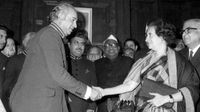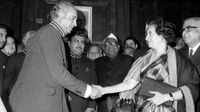In a significant escalation of tensions between India and Pakistan, Islamabad announced on April 24, 2025, that it was suspending the 1972 Simla Agreement. This decision comes in the wake of a deadly terror attack in Pahalgam, Jammu and Kashmir, which resulted in the deaths of 26 civilians, mostly tourists. The attack has led to a series of retaliatory measures from India, including the downgrading of diplomatic ties and the suspension of the Indus Water Treaty.
The Simla Agreement, signed on July 2, 1972, by Indian Prime Minister Indira Gandhi and Pakistani President Zulfikar Ali Bhutto, was a landmark treaty aimed at normalizing relations between the two countries following the 1971 Indo-Pakistani war. This war resulted in the creation of Bangladesh, and the agreement was intended to promote peace and cooperation between the two nuclear-armed neighbors.
Key provisions of the Simla Agreement included the commitment to resolve disputes through peaceful bilateral negotiations, the recognition of the Line of Control (LoC) as the de facto border in Jammu and Kashmir, and the non-interference in each other's internal affairs. Furthermore, the agreement mandated that neither side would unilaterally alter the status of the LoC.
Despite its ambitious goals, the Simla Agreement has had a mixed legacy. Although it restored communication and reduced immediate tensions, it did not prevent future conflicts, including the Kargil War in 1999 and the Siachen Glacier conflict in 1984. Pakistan has repeatedly violated the terms of the agreement, leading to further hostilities.
The recent terror attack in Pahalgam, attributed to militants affiliated with the group Lashkar-e-Taiba, prompted India to take drastic measures in response. India’s Cabinet Committee on Security decided to expel three defense advisers from the Pakistan High Commission in New Delhi and announced that it would hold the Indus Water Treaty in abeyance. India's Ministry of External Affairs also revoked all valid visas issued to Pakistani nationals, effective April 27, 2025, and advised Indian citizens to avoid traveling to Pakistan.
In reaction to India’s actions, Pakistan's National Security Committee convened an emergency meeting chaired by Prime Minister Shehbaz Sharif. The committee decided to close its airspace to Indian carriers and suspended the SAARC Visa Exemption Scheme for Indian nationals, except for Sikh pilgrims. Pakistan also declared Indian military diplomats persona non grata, ordering their exit by April 30, 2025.
The suspension of the Simla Agreement marks a significant shift in Pakistan's diplomatic stance, potentially opening the door for Islamabad to seek third-party mediation in the Kashmir conflict. This move directly contradicts the bilateral approach that the Simla Agreement has upheld for over five decades. Pakistan’s Prime Minister’s Office stated, "Pakistan shall exercise the right to hold all bilateral agreements with India, including but not limited to the Simla Agreement, in abeyance, till India desists from its manifested behavior of fomenting terrorism inside Pakistan."
Historically, the Simla Agreement has been viewed as a cornerstone of India-Pakistan relations. It was designed to foster a framework for dialogue and cooperation, particularly regarding the Kashmir issue, which has been a longstanding point of contention between the two nations. The agreement emphasized that all disputes should be settled through direct negotiations, effectively ruling out international mediation.
However, the relationship between the two countries has been fraught with tension and conflict since the signing of the Simla Agreement. The Kargil War in 1999 and the Siachen Glacier conflict serve as stark reminders of the fragile nature of this diplomatic framework. Despite the agreement, both nations have engaged in military confrontations, and ceasefire violations along the LoC have been frequent.
In light of the recent developments, analysts express concern that the suspension of the Simla Agreement could lead to increased hostilities and further destabilization of the region. The LoC has long been a flashpoint, and if the mutual commitment to maintain its sanctity is no longer upheld, it could result in heightened military engagement.
While the Simla Agreement has been criticized for its inability to resolve the Kashmir dispute permanently, it has provided a diplomatic framework that both nations have relied upon. The recent decision by Pakistan to suspend the agreement may not have immediate tactical consequences, but it could undermine any remaining prospects for dialogue and escalate tensions further.
As the situation unfolds, it remains to be seen how both countries will navigate this new chapter in their complex relationship. The international community is closely watching, as any significant escalation could have broader implications for regional stability and security.
In summary, the suspension of the Simla Agreement by Pakistan following the Pahalgam terror attack represents a troubling development in Indo-Pak relations. It underscores the fragile nature of peace in South Asia and the ongoing challenges both nations face in achieving lasting reconciliation.






